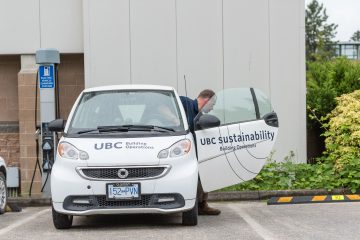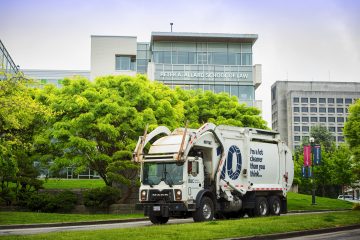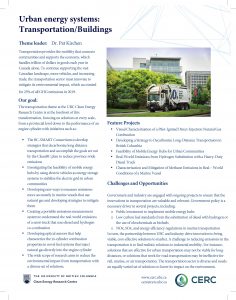
Urban energy systems: Transportation / buildings
The transportation theme at the UBC Clean Energy Research Centre is at the forefront of this transformation, focusing on solutions at every scale, from a provincial level down to the performance of an engine cylinder with initiatives such as:
- The BC-SMART Consortium to develop strategies that decarbonize long distance transportation and accomplish the goals set out by the CleanBC plan to reduce province-wide emissions
- Investigating the feasibility of mobile energy hubs by using electric vehicles as energy storage systems to stabilize the electric grid in urban communities
- Developing new ways to measure emissions more accurately in marine vessels that use natural gas and developing strategies to mitigate them
- Creating a portable emissions measurement system to understand the real-world emissions of a semi-truck that uses diesel and hydrogen co-combustion
- Developing optical sensors that help characterize the in-cylinder combustion properties in novel fuel systems that inject natural gas directly into the engine cylinder
The wide scope of research aims to reduce the environmental impact from transportation with a diverse set of solutions.


FEATURE PROJECTS
- Visual Characterization of a Pilot-Ignited Direct-Injection Natural Gas Combustion (Research Summary)
- Developing a Strategy to Decarbonize Long-Distance Transportaion in British Columbia (Research Summary)
- Feasibility of Mobile Energy Hubs for Urban Communities (Research Summary)
- Real-World Emissions from Hydrogen Substitution with a Heavy-Duty Diesel Truck (Research Summary)
- Characterization and Mitigation of Methane Emissions in Real – World Conditions of a Marine Vessel (Research Summary)
Challenges and Opportunities
Government and industry are engaged with ongoing projects to ensure that the innovations in transportation are valuable and relevant. Government policy is a necessary driver in several projects, including:
- Public investment to implement mobile energy hubs
- Low carbon fuel standards from the substitution of diesel with hydrogen or the use of oleochemicals as biofuels
- NOx, SOx, and energy efficiency regulations in marine transportation
In turn, the partnership between UBC and industry drive innovation to bring viable, cost-effective solutions to market. A challenge to reducing emissions in the transportation is to find realistic solutions to industrial mobility. For instance, solutions that are effective for urban transportation may not be viable for long-distances, or solutions that work for road transportation may be ineffective for rail, marine, or air transportation. The transportation sector is diverse and needs an equally varied set of solutions to lower its impact on the environment.
Theme members
Theme leader

